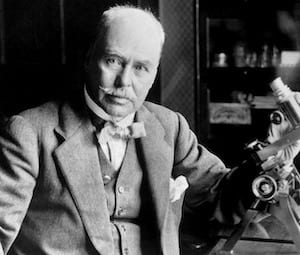Ronald Ross
Major Ronald Ross (1857-1932) was the epitome of the Victorian bug hunters, born in the Himalayas in the heyday of the British Empire, he returned to his roots as a physician where he pursued Manson and Laveran’s hypothesis that the mosquito acted as a nurse to the malaria parasite.
Unlike Manson, Ross was not a natural microscopist and progress was slow. He paid patients to allow mosquitoes to bite, then dissected mosquitoes after their blood meal. The account of how he stumbled upon what we now know as the sporozoite stage of the Plasmodium life cycle has grown in the telling, but it was enough to earn him a share of the 1902 Nobel Prize for Medicine.
His studies in vector borne diseases took him to many parts of the tropics, including West Africa, the Middle east and Mauritius, resulting in the development of mathematic methods for epidemiological analysis. His later years brought a series of awards and honours, an institute named after him and the recognition of his peers for his continued contributions to understanding malaria.
His passion for hunting down bugs was not restricted to Plasmodium species. While pursuing malaria in Bangalore, his work was interrupted by a cholera epidemic. He entreated public health officials to introduce a sanitation programme, but lacked the charisma, the contacts or clout to put his knowledge into wider practice. Like many gentlemen bug hunters who had been early adopters of Pasteur’s germ theory, he was ahead of his time.

eponym
the person behind the name

